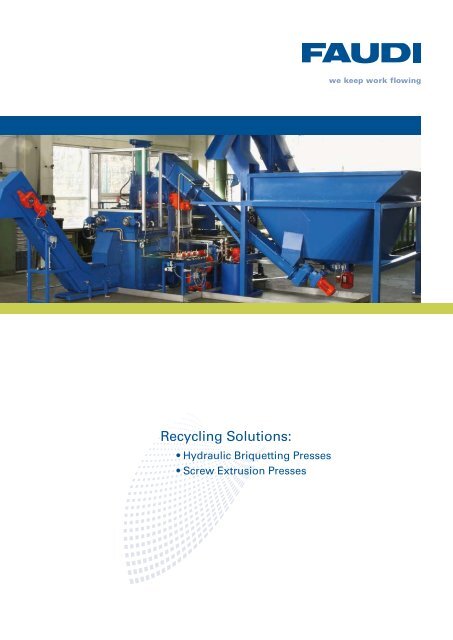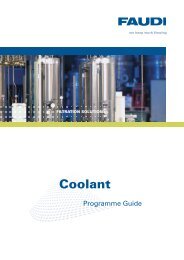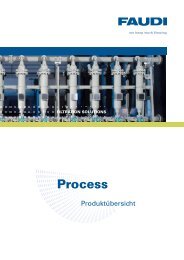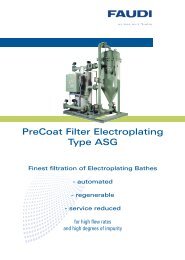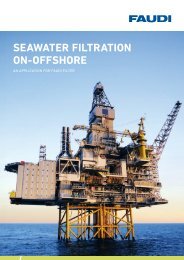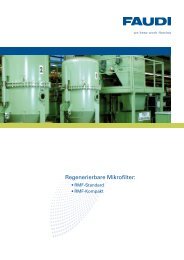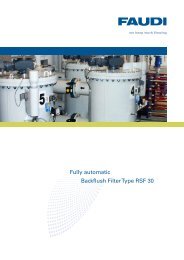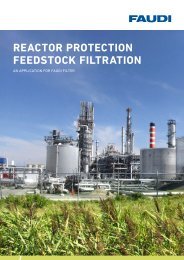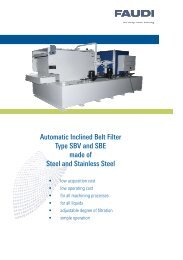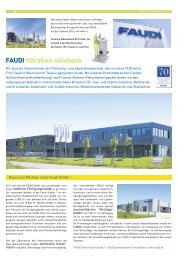Recycling Solutions: - Faudi
Recycling Solutions: - Faudi
Recycling Solutions: - Faudi
You also want an ePaper? Increase the reach of your titles
YUMPU automatically turns print PDFs into web optimized ePapers that Google loves.
<strong>Recycling</strong> <strong>Solutions</strong>:<br />
• Hydraulic Briquetting Presses<br />
• Screw Extrusion Presses
From Waste Materials to Recyclables<br />
W<br />
ith its screw extrusion presses and hydraulic briquetting presses, FAUDI is able to offer its customers economical<br />
and environment-friendly solutions for converting valuable production residuals into recyclable secondary raw materials.<br />
The fields of application are most diverse and include, amongst others, recycling, resource recovery, dehydration and<br />
de-oiling.<br />
Waste products accumulated during production processes,<br />
such as abrasive slurry or grinding debris, cuttings and<br />
swarf, are usually of quite considerable volume. These – in<br />
part – valuable raw materials needn’t require cost-intensive<br />
disposal. Thanks to FAUDI’s screw extrusion and briquetting<br />
presses, residual oils and emulsions can be separated from<br />
other residual materials and recirculated into the lubricant<br />
cycle with ease. Dehydration of residuals by way of a<br />
screw extrusion press facilitates the further treatment, i.e.,<br />
briquetting, of residual materials such as abrasive slurry.<br />
Implementing this process makes it possible to recover<br />
and reuse residual oils and emulsions, leading to a saving<br />
of up to 95 % of clean oil. At the same time, the volume<br />
of residual materials to be disposed of at cost is reduced<br />
considerably. During the briquette pressing process, swarf<br />
is separated from cooling lubricants and reformed into<br />
What types of materials can be processed?<br />
Cuttings/Swarf<br />
Aluminium swarf, brass and copper<br />
swarf, steel chips, magnesium swarf,<br />
cast iron and cast steel swarf, stainless<br />
steel chips<br />
Slag/Cinder/Dust<br />
Slag, cinder and dust of every variety<br />
highly compressed and easy-to-handle briquettes. The refined<br />
swarf is now ready for sale to recyclers at a much higher<br />
profit than before processing.The implementation of FAUDI<br />
screw extrusion and briquetting presses helps to achieve a<br />
considerable reduction in costs, not to mention the environmental<br />
considerations involved. Our hydraulic briquetting<br />
presses and screw extrusion presses can be easily combined<br />
with FAUDI filter systems. It is also possible to refit<br />
commercial filter systems of other manufacturers with our<br />
briquetting and/or screw extrusion presses, thus optimising<br />
cooling lubricant reconditioning processes.<br />
Abrasive slurry<br />
Grinding debris and abrasive slurry of<br />
every variety<br />
Dehydration via screw extrusion<br />
presses greatly facilitates the briquetting<br />
of abrasive slurry.
Our Concept – The Perfect Solution<br />
Saving Costs – Saving the Environment<br />
Melting<br />
Plant<br />
<strong>Recycling</strong><br />
Management<br />
Valuable<br />
Briquettes<br />
There is no way to fully avoid the accumulation of processrelated<br />
swarf, abrasive slurry and slag when processing<br />
metals. The oil content of these residual materials makes<br />
subsequent treatment very difficult. Thanks to FAUDI’s<br />
Production<br />
Process<br />
<strong>Recycling</strong><br />
Process<br />
Filtration<br />
Production<br />
Waste<br />
Screw<br />
Extrusion Press/<br />
Briquetting<br />
Press<br />
screw extrusion presses and briquetting presses for metal<br />
swarf and abrasive slurry and the implementation of FAUDI<br />
filter systems for the treatment of cooling lubricants, we<br />
are able to offer our customers a comprehensive and profitable<br />
solution for converting expensive production residues<br />
into recyclable secondary raw materials.
Your Advantages at a Single Glance<br />
W<br />
e offer you a unique disposal concept specifically tailored to your requirements and your fields of application.<br />
To counteract against the increasing pressure placed on companies with regard to waste disposal and environmental<br />
safety conditions, FAUDI is able to present to you a comprehensive concept that comprises much more than the briquetting<br />
of your waste materials.<br />
Adhesive slurry continues to cause problems in the briquetting<br />
of residuals. The press performance of briquetting<br />
presses depends in large part on the amount of fluids,<br />
hydration or residual moisture present in the slurry to be<br />
processed. The lower the amount of residual moisture of<br />
the slurry, the higher the output performance of the press.<br />
FAUDI screw extrusion presses make it possible to dehydrate<br />
abrasive slurry, thereby greatly facilitating the briquetting<br />
process.<br />
The Advantages of FAUDI Screw Extrusion and Briquetting Presses<br />
Total Cost of Ownership<br />
Total Cost of Ownership (TCO) is an important factor for our<br />
engineers in their ongoing development work. By using only<br />
the highest-quality components in designing our products,<br />
we are able to offer our customers equipment that is reliable,<br />
long-lasting and safe.<br />
Tests under Operating Conditions<br />
FAUDI tests the press characteristics of various materials<br />
and develops a tailored systems concept for your company.<br />
Process Connection<br />
FAUDI makes possible the direct recirculation of treated<br />
cooling lubricants into the production process.<br />
Electronic Control<br />
Modern and high-performance electronic control systems<br />
facilitate the performance of fully automated press processes.<br />
A control loop guarantees uniform briquette length.<br />
Our hydraulic briquetting presses and screw extrusion<br />
presses can be easily combined with FAUDI filter systems.<br />
It is also possible to refit commercial filter systems of other<br />
manufacturers with our briquetting and/or screw extrusion<br />
presses, thus optimising cooling lubricant reconditioning<br />
processes.<br />
Maintenance Concept<br />
Recognising signs of wear and tear well in advance: Our<br />
elaborate maintenance concept guarantees for a smooth<br />
and trouble-free production sequence.<br />
Spare-Parts Service<br />
Our service specialists guarantees quickest possible repair<br />
and return to operation in the unlikely event of production<br />
interruption or breakdown due to wear and tear of parts.<br />
Years of Experience<br />
The competence shown, experience gained and numerous<br />
successful customer solutions realised by FAUDI speak for<br />
themselves.
The Efficiency of FAUDI Briquetting Presses<br />
Briquetting presses for the treatment of abrasive slurry and swarf are a most expedient investment. The reduction of<br />
waste and costs, a dramatic decrease in clean-oil demand and the conversion of waste into recyclables speak for the<br />
efficiency and profitability of briquetting presses.<br />
An Expedient Investment<br />
Calculation model 1:<br />
Material: Abrasive slurry<br />
Lubricant: Oil<br />
Material: C100<br />
Amount of material to be treated: 500 t/a<br />
Residual oil amount (slurry): 50 %<br />
Residual oil amount (briquette): ca 8 %<br />
Disposal costs: 100 €/t<br />
Briquette utilisation: 50 €/t<br />
Oil costs: 1,50 €/kg<br />
Waste amount (in t/a) With briquetting Without briquetting<br />
Solids 250 t 250 t<br />
Oil 22 t 250 t<br />
Total amount of waste 272 t 500 t<br />
Oil savings: 228 t<br />
Clean-oil demand (in €/a at 1,5 €/kg) 22 t 250 t<br />
33.000 € 375.000 €<br />
Clean-oil savings: 342.000 €<br />
Disposal costs (in €/a, 1t=100 €) – 500 t<br />
– 50.000 €<br />
Disposal cost savings: 50.000 €<br />
Sales revenue (in €/a) 272 t –<br />
Sales price in €/t 50 € –<br />
Total profits 13.600 € –<br />
Total: 13.600 €<br />
Total savings (in €/a): 405.600 €<br />
Calculation model 2:<br />
Material: Aluminium<br />
Lubricant: Oil<br />
Material: ALSi7<br />
Amount of material to be treated: 1000 t/a<br />
Residual oil amount (swarf): 20 %<br />
Residual oil amount (briquette): ca 4 %<br />
Swarf recycling: 600 €/t<br />
Briquette utilisation: 700 €/t<br />
Oil costs: 1,50 €/kg<br />
Waste amount (in t/a) With briquetting Without briquetting<br />
Solids 800 t 800 t<br />
Oil 40 t 200 t<br />
Total amount of waste 840 t 1000 t<br />
Oil savings: 160 t<br />
Clean-oil demand (in €/a at 1,5 €/kg) 40 t 200 t<br />
60.000 € 300.000 €<br />
Clean-oil savings: 240.000 €<br />
Total profits (in €/a) 800 t 800 t<br />
Sales price in €/t 700 € 600 €<br />
Total 560.000 € 480.000 €<br />
Additional profit: 80.000 €<br />
Difference in profit (in €/a): + 320.000 €<br />
The values specified in the above models serve only to provide a sample calculation and are not to be understood as binding<br />
performance guarantees.
Functional Description of the Briquetting Process<br />
Process Sequence<br />
1. A conveyer belt feeds the waste material to be briquetted<br />
into a screw feeder A . This feeder feeds the material<br />
into a precompressor B .<br />
2. The precompressor B loads the material into the press<br />
mould, where it remains until the main press cylinder C<br />
has moved to the end of the precompressor.<br />
3. The precompressor B returns to its original position.<br />
The screw feeder A continues to feed material into the<br />
precompressor.<br />
4. The main press cylinder C extends and compacts the<br />
material under high pressure into a solid briquette.<br />
Shifting cylinder E<br />
Briquette<br />
discharge G<br />
5. The main press cylinder C releases pressure and<br />
remains in its current position at standstill.<br />
6. The shifting cylinder E shifts the press block D over<br />
the main press piston until the main press chamber F<br />
is fully opened and the briquette falls through the<br />
briquette discharge G .<br />
7. The main press cylinder C retracts.<br />
8. The press block D retracts with the help of the shifting<br />
cylinder E until the press chamber is once again fully<br />
closed.<br />
Screw feeder A B Precompressor C Main press cylinder<br />
Press block D<br />
Oil drip pan I<br />
Press chamber F<br />
H Hydraulic system
Technical Data/Briquetting Press<br />
As your competent partner for all product development matters, FAUDI is able to support you with all of its knowhow<br />
and expertise. Our common objective? The development and implementation of the most suitable processes<br />
for the recovery of recyclables as well as overall disposal cost reduction.<br />
An Overview of FAUDI Presses<br />
Each FAUDI briquette press is developed to suit individual requirements. In order to determine these requirements precisely,<br />
one needs precise material data. Our qualified engineers would be happy to visit you and your company on site to obtain a<br />
better understanding of your operation and your requirements. Our solutions will be tailored to suit your very specific demands.<br />
Press type Briquette size Output [kg/h]<br />
Compact solution<br />
Abrasive slurry<br />
approx.<br />
3 kg/dm³<br />
Connection<br />
power [kw]<br />
Press cylinder<br />
Briquette density Main press cylinder Compressive<br />
force<br />
Aluminium<br />
approx.<br />
2,3 kg/dm³<br />
Steel / Cast<br />
approx.<br />
5,3 kg/dm³<br />
Max. system<br />
pressure max.<br />
WSPK 7,5.060 ø60x70mm bis 40 35 80 7,5 180 mm 950 kN 250 bar<br />
WSP 7,5.060<br />
20 – 70 50 100 7,5<br />
250 bar<br />
ø60x70mm<br />
220 mm 950 kN<br />
WSP 15.060 – 100 200 15 250 bar<br />
WSP 15.080<br />
50 – 130 100 200 15<br />
250 bar<br />
ø80x90mm<br />
280 mm 1540 kN<br />
WSP 30.080 – 200 400 30 250 bar<br />
WSP 30.095<br />
100 – 200 150 350 30<br />
250 bar<br />
ø95x100mm<br />
320 mm 2010 kN<br />
WSP 55.095 – 300 700 55 250 bar<br />
WSP 55.120<br />
150 – 350 320 750 55<br />
250 bar<br />
ø120x100mm<br />
400 mm 3140 kN<br />
WSP 170.120 – 650 1500 170 250 bar<br />
The data specified in the table is based on experience values only and is not intended for interpretive purposes. Systems<br />
offering technical data different than those parameters listed above are available upon request.<br />
Our Product – Your Profit<br />
Recovery of expensive oils and emulsions<br />
(cooling lubricants)<br />
Reduction in overall waste<br />
Reduction in storage volume of abrasive slurry<br />
Reduction in transport volume and, consequently,<br />
transport costs<br />
Conversion of waste materials such as abrasive slurry<br />
and swarf into recyclable secondary raw materials<br />
Increase of profits through briquetting<br />
Positive image for environmental audits
The Efficiency of FAUDI Screw Extrusion Presses<br />
W<br />
ith its range of screw extrusion presses, FAUDI offers its customers an economical and environment-friendly solution<br />
for significantly reducing production residuals. The fields of application are most diverse and include, amongst<br />
others, recycling, dehydration and de-oiling.<br />
Acting as supplementary modules, FAUDI screw extrusion presses can be easily combined with briquetting presses, thereby<br />
increasing the cycle time. They can however also be implemented as economical “stand-alone” solutions.<br />
An Expedient Investment<br />
Calculation model:<br />
Material: Adhesive slurry<br />
Cooling lubricant: Oil<br />
Material: C100<br />
Amount of material to be treated: 500 t/a<br />
Residual oil amount (inflow): 50 %<br />
Residual oil amount (outflow): 30 %<br />
Waste disposal costs: 100 €/t<br />
Oil costs: 1,50 €/kg<br />
Waste amount (in t/a) With screw extrusion press Without screw extrusion press<br />
Solids 250 t 250 t<br />
Oil 107 t 250 t<br />
Total amount of waste 357 t 500 t<br />
Oil savings: 143 t<br />
Clean-oil demand (in €/a at 1,5 €/kg) 107 t 250 t<br />
160.500 € 375.000 €<br />
Clean-oil savings: 214.500 €<br />
Disposal costs (in €/a, 1t=100 €) 357 500 t<br />
35.700 50.000 €<br />
Disposal cost savings: 14.300 €<br />
Total savings (in €/a): 228.800 €<br />
The values specified in the above models serve only to provide a sample calculation<br />
and are not to be understood as binding performance guarantees.
Technical Description of the Dehydration Process<br />
Process Sequence<br />
1. A conveyer belt feeds the slurry to be dehydrated into<br />
the inlet A of the screw extrusion press.<br />
2. The rotary motion of the screw B causes the moist<br />
slurry to be fed into the dehydration area C , which is<br />
equipped with a filter cylinder in which fluid is separated<br />
from solid matter.<br />
3. The outlet D is equipped with a spring-loaded plate E ,<br />
which regulates the pressure in the dehydration area.<br />
Screw B<br />
Inlet A<br />
G Reverse-flow system<br />
4. A fluid outlet F conducts fluids now separated from<br />
solids to the reverse-flow system G . The dry slurry is<br />
dropped through the exit slot H .<br />
5. Fluids returning from the reverse-flow system G are<br />
conducted back into the system.<br />
F Fluid outlet<br />
C Dehydration area<br />
D Outlet<br />
E Spring-loaded plate<br />
H Exit slot
Technical Data/Screw Extrusion Presses<br />
An Overview of FAUDI Screw Extrusion Presses<br />
Each FAUDI screw press is developed to suit individual requirements. In order to determine these requirements precisely,<br />
one needs precise material data. Our qualified engineers would be happy to visit you and your company on site to obtain<br />
a better understanding of your operation and your requirements. Our solutions will be tailored to suit your very specific<br />
demands.<br />
Screw Extrusion Press<br />
Press type<br />
Transported<br />
material<br />
Our Product – Your Profit<br />
Recovery of expensive oils and emulsions<br />
Reduction in overall waste<br />
Reduction in storage volume of abrasive slurry<br />
Reduction in transport volume and, consequently,<br />
transport costs<br />
Cooling<br />
lubricant<br />
Input power<br />
(kW)<br />
Input speed<br />
Screw diameter<br />
(mm)<br />
Fluid inflow Fluid outflow<br />
Conversion of abrasive slurry from residual material to<br />
recyclable raw secondary material<br />
Increase of output performance of briquetting presses<br />
thanks to dehydration of slurry<br />
Positive image for environmental audits<br />
Delivery rate<br />
(kg/h)<br />
EEA 150 Slurry Oil/Emulsion 0,37 8 min -1 150 50-80 % 30 % ca. 150<br />
EEA 200 Slurry Oil/Emulsion 0,75 8 min -1 200 50-80 % 30 % ca. 300<br />
EEA 250 Slurry Oil/Emulsion 1,1 8 min -1 250 50-80 % 30 % ca. 450<br />
The data specified in the table is based on experience values only and is not intended for interpretive purposes. Systems<br />
offering technical data different than those parameters listed above are available upon request.
Hydraulic briquetting press with corresponding materials handling technology
Detail of a hydraulic briquetting press<br />
We would be happy to provide further information<br />
on our full range of filter systems.<br />
FAUDI GmbH Scharnhorststrasse 7 35260 Stadtallendorf Germany Phone +49 (0) 64 28 702-0 Fax +49 (0) 64 28 702-188 info@faudi.com www.faudi.com<br />
The data published herein serves only for the purpose of product description and is not to be understood as a guaranteed performance characteristic in the legal sense. © March 2008.<br />
www.kodex-agentur.de Catalogue no. 02.1.002.01


